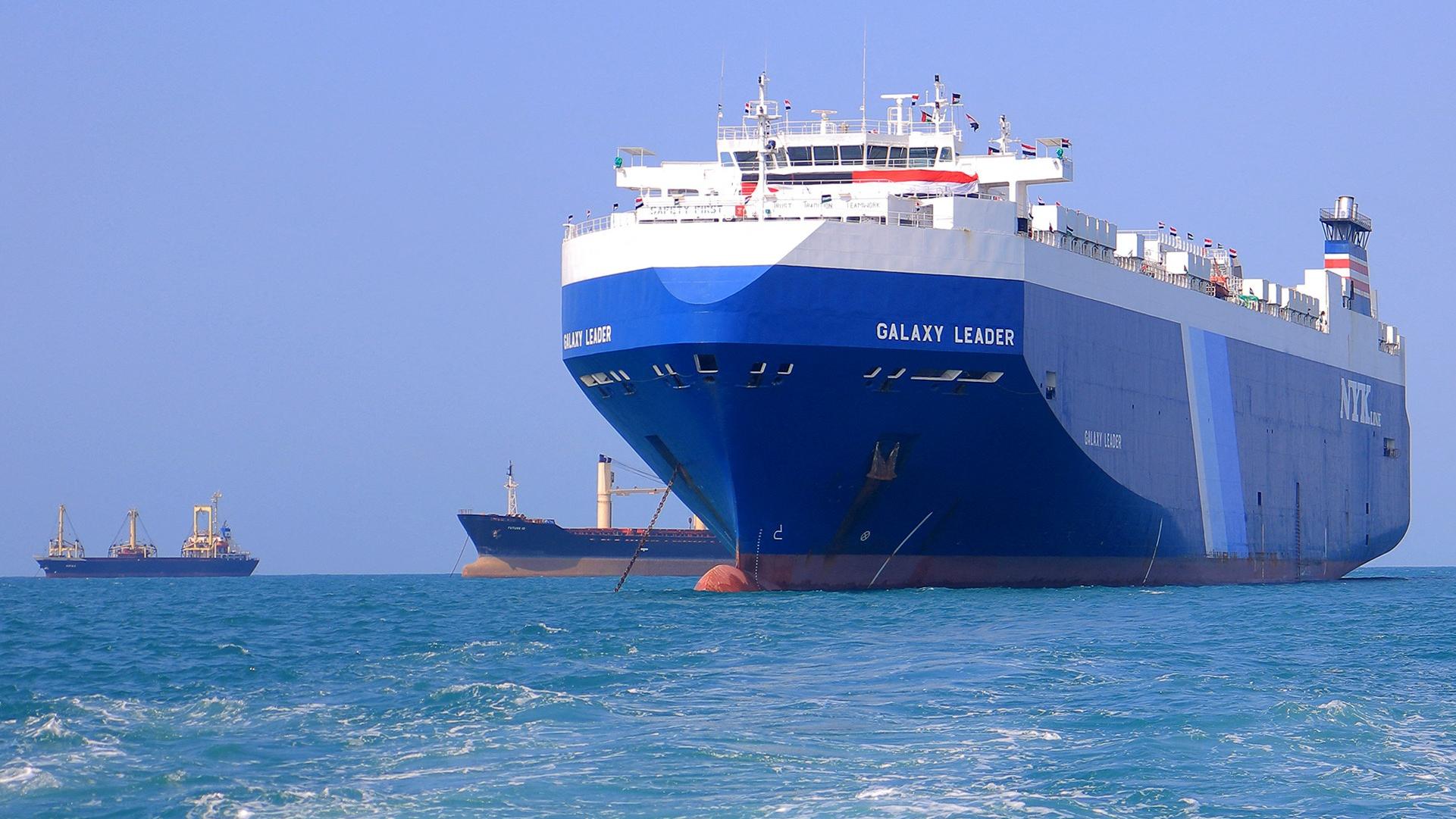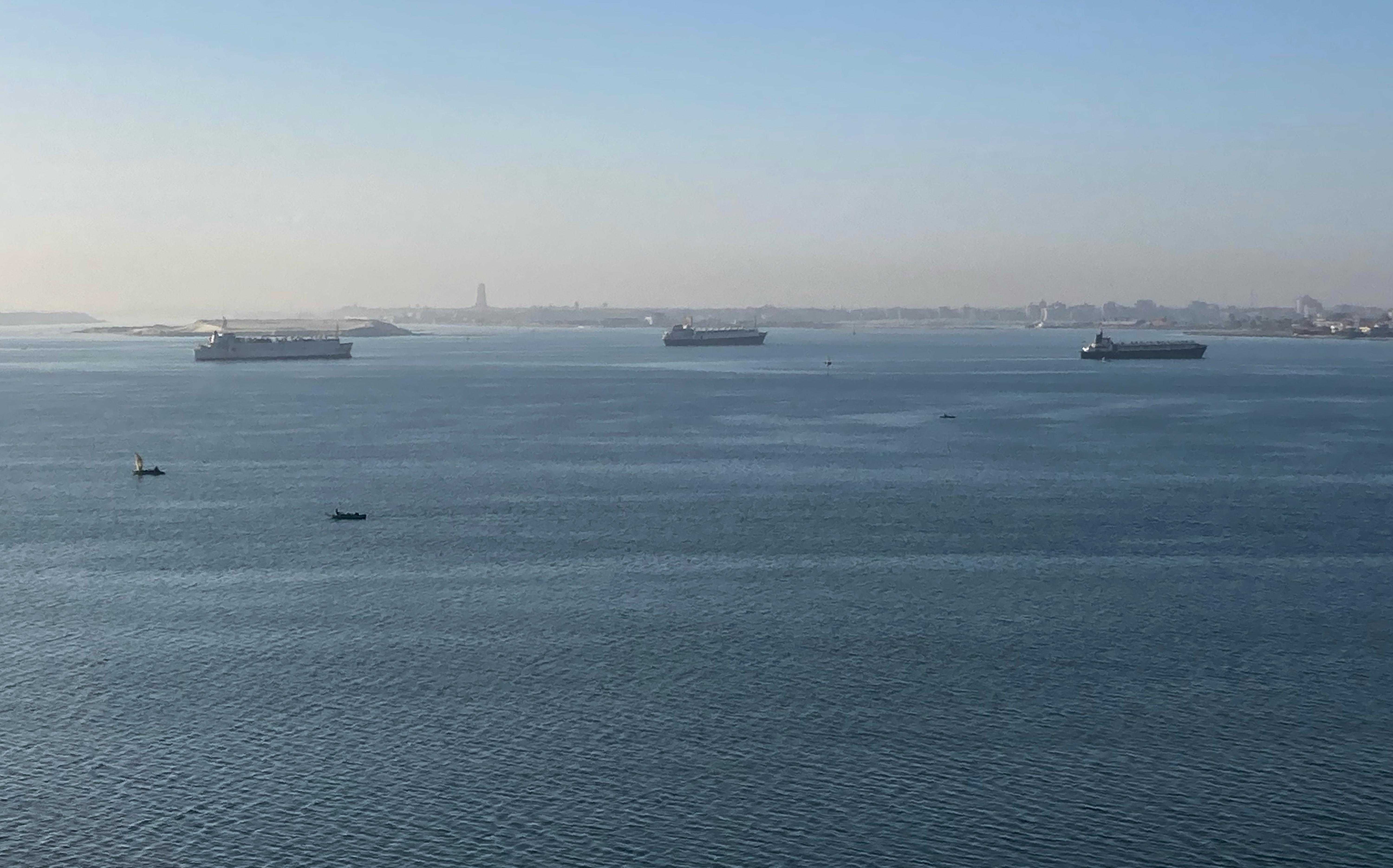 A picture taken during an organized tour by Yemen's Houthi rebels on Nov 22, 2023, shows the Galaxy Leader cargo ship (right), seized by Houthi fighters two days earlier, approaching the port in the Red Sea off Yemen's province of Hodeida. (PHOTO / AFP)
A picture taken during an organized tour by Yemen's Houthi rebels on Nov 22, 2023, shows the Galaxy Leader cargo ship (right), seized by Houthi fighters two days earlier, approaching the port in the Red Sea off Yemen's province of Hodeida. (PHOTO / AFP)
UNITED NATIONS/CAIRO - Houthi attacks on ships in the Red Sea have cut Suez Canal trade volume by 42 percent since November, a UN trade official said on Thursday.
The disruption adds to the strain shipping routes have been hit with on other major routes, in the Black Sea, hampered by the war in Ukraine, and through the Panama Canal, suffering from climate change-induced low freshwater levels, threatening consumer price hikes, said Jan Hoffmann, chief of the Trade Facilitation Section of the UN Conference on Trade and Development (UNCTAD).
ALSO READ: Yemeni govt warns Houthis against escalation in Red Sea
"We are concerned that the attacks on Red Sea shipping are adding tensions to a context of global trade disruptions due to geopolitics and climate change," Hoffmann told reporters at the UN headquarters in a video briefing from Geneva. "These disruptions underline global trade's vulnerability."
UNCTAD said the Red Sea crisis is causing significant disruptions in the shipments of grains and other critical commodities from Europe, Russia and Ukraine
He said maritime trade carries around 80 percent of the goods in world trade, with an even higher percentage for developing countries where shipping prices are already rising, notably in container and tanker shipping. Gas carriers, particularly, fear going through the Red Sea to Suez out of fear a Houthi attack could trigger a ship explosion.
UNCTAD said the Red Sea crisis is causing significant disruptions in the shipments of grains and other critical commodities from Europe, Russia and Ukraine. This situation leads to increased costs for consumers and serious risks to global food security, especially in regions like East Africa, South Asia, Southeast Asia and East Asia, which rely heavily on wheat imports from Europe and the Black Sea area.
READ MORE: NZ deploys defense team to safeguard Red Sea shipping
Hoffmann said that prolonged disruptions in major trade routes would disrupt global supply chains, leading to delayed deliveries of goods, increased costs and potential inflation. The shipping industry is already witnessing immediate impacts, with spot rate increases from Asia to Europe exceeding the levels seen in 2023.
He said the rates between China and the Mediterranean have more than tripled since early December. Longer trade distances and higher freight rates caused by going around Africa could have cascading effects on food prices.
UNCTAD estimated that about half of the increase in food prices observed in 2022 was due to higher transport costs.
 In this file photo taken on March 25, 2021, ships anchor in Lake Timsah, Ismailia, halfway through Egypt's Suez Canal. (PHOTO / AP)
In this file photo taken on March 25, 2021, ships anchor in Lake Timsah, Ismailia, halfway through Egypt's Suez Canal. (PHOTO / AP)
Red Sea tensions to raise carbon emissions
Chairman of Egypt's Suez Canal Authority (SCA) Osama Rabie said on Thursday that ongoing tensions in the Red Sea threaten "to exacerbate the volume of harmful carbon emissions of vessels as they consume larger amounts of fuel when they take alternative routes and sail for longer distances."
ALSO READ: Red Sea crisis seeps into German chemicals sector
His comments came during a virtual meeting with Arsenio Dominguez Velasco, the newly appointed secretary-general of the International Maritime Organization (IMO), to discuss the repercussions of the current situation in the Red Sea region.
According to an SCA statement, Rabie added that the Suez Canal saves fuel consumption and harmful carbon emissions compared to alternative routes, reducing carbon emissions by 55.4 million tons in 2023
"Navigation in the Suez Canal continues and has not stopped despite the various challenges... and we continue to communicate with customers and support them by providing new services that have not been provided before," Rabie said.
According to an SCA statement, Rabie added that the Suez Canal saves fuel consumption and harmful carbon emissions compared to alternative routes, reducing carbon emissions by 55.4 million tons in 2023.
The IMO secretary-general voiced support for freedom of navigation and called for calm in the Red Sea region.
READ MORE: UN Security Council demands Houthis stop Red Sea attacks
"We are delivering a clear message that navigation in the Suez Canal is still open to everyone," said he.
Both officials discussed the recent developments in the Red Sea and Bab al-Mandab region, as well as mechanisms of cooperation and joint action to reduce the effects of the crisis on global supply chains and maritime freight traffic, added the statement.
On Monday, Rabie said the SCA's companies and shipyards prepared to offer repair and maintenance services that transiting ships may need when encountering breakdowns or emergencies.
ALSO READ: Report: US-UK strikes hit Yemen's Red Sea port city of Hodeidah
The Houthi group launched attacks on Red Sea ships last November, saying it was a response to the Israeli strikes on the Gaza Strip. The Red Sea tension escalated after American and British warplanes struck Houthi sites in Yemen earlier this month.


